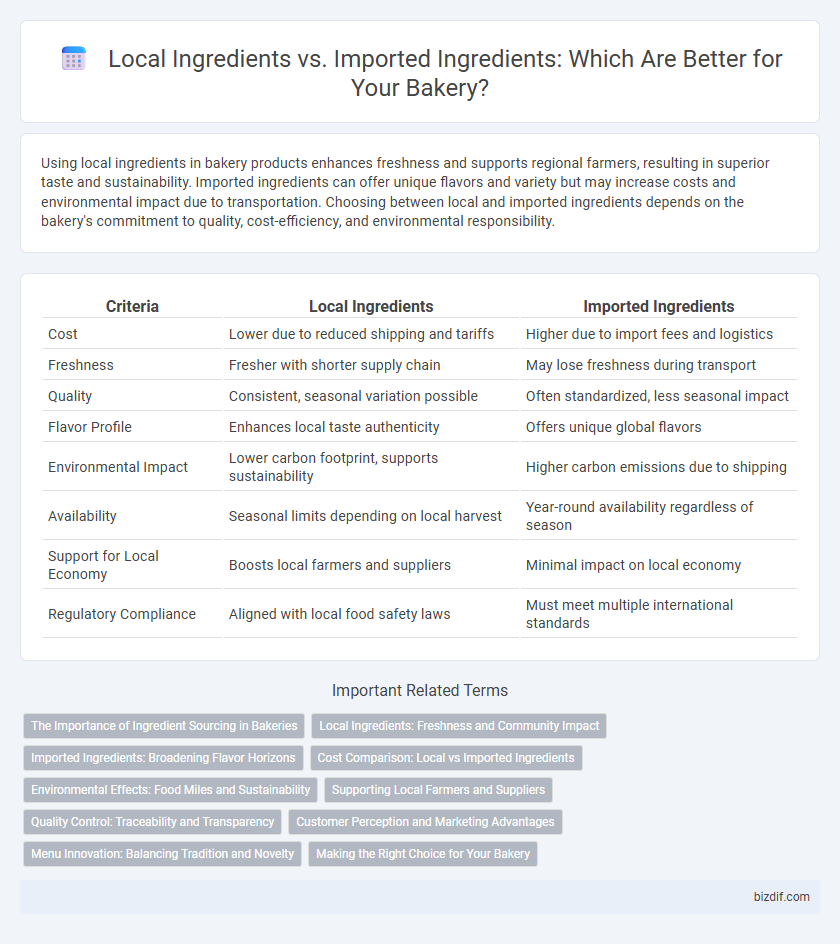Using local ingredients in bakery products enhances freshness and supports regional farmers, resulting in superior taste and sustainability. Imported ingredients can offer unique flavors and variety but may increase costs and environmental impact due to transportation. Choosing between local and imported ingredients depends on the bakery's commitment to quality, cost-efficiency, and environmental responsibility.
Table of Comparison
| Criteria | Local Ingredients | Imported Ingredients |
|---|---|---|
| Cost | Lower due to reduced shipping and tariffs | Higher due to import fees and logistics |
| Freshness | Fresher with shorter supply chain | May lose freshness during transport |
| Quality | Consistent, seasonal variation possible | Often standardized, less seasonal impact |
| Flavor Profile | Enhances local taste authenticity | Offers unique global flavors |
| Environmental Impact | Lower carbon footprint, supports sustainability | Higher carbon emissions due to shipping |
| Availability | Seasonal limits depending on local harvest | Year-round availability regardless of season |
| Support for Local Economy | Boosts local farmers and suppliers | Minimal impact on local economy |
| Regulatory Compliance | Aligned with local food safety laws | Must meet multiple international standards |
The Importance of Ingredient Sourcing in Bakeries
Sourcing local ingredients in bakeries ensures freshness, supports community farmers, and reduces carbon footprint, enhancing the overall quality and sustainability of baked goods. Imported ingredients, while sometimes necessary for unique flavors or specific recipes, often involve longer transit times and higher environmental costs. Prioritizing transparent sourcing practices helps bakeries maintain product authenticity, meet customer expectations, and promote ethical supply chains.
Local Ingredients: Freshness and Community Impact
Local ingredients in bakery products offer unmatched freshness, enhancing flavor and nutritional value due to minimal transportation time. Utilizing locally sourced flour, dairy, and fruits supports regional farmers and strengthens the local economy by keeping supply chains within the community. This practice reduces environmental impact through lower carbon emissions and fosters sustainable agriculture, benefiting both consumers and the surrounding ecosystem.
Imported Ingredients: Broadening Flavor Horizons
Imported ingredients bring unique flavors and textures that expand a bakery's creative range, introducing rare spices, exotic fruits, and specialty flours unavailable locally. These diverse inputs enhance product differentiation and attract customers seeking innovative taste experiences. Leveraging global sourcing networks helps bakeries maintain quality and consistency while exploring international baking traditions.
Cost Comparison: Local vs Imported Ingredients
Local ingredients in bakery production typically reduce costs by minimizing transportation fees and import taxes, resulting in more affordable raw materials. Imported ingredients often carry higher prices due to shipping expenses, customs duties, and longer supply chains, increasing the overall production cost. Utilizing local ingredients not only supports regional farmers but also enhances bakery profit margins through cost-efficient sourcing.
Environmental Effects: Food Miles and Sustainability
Using local ingredients in bakery production significantly reduces food miles, lowering greenhouse gas emissions associated with transportation and promoting sustainability. Imported ingredients often result in higher carbon footprints due to long-distance shipping, increased fuel consumption, and packaging waste. Prioritizing locally sourced flour, fruits, and dairy supports regional agriculture and contributes to a more environmentally responsible bakery supply chain.
Supporting Local Farmers and Suppliers
Using local ingredients in bakery products enhances freshness and supports the sustainability of regional agriculture. Sourcing from local farmers reduces carbon footprints and strengthens the local economy by creating jobs and ensuring fair trade practices. Prioritizing local suppliers helps bakeries maintain a transparent supply chain, promoting trust and community engagement.
Quality Control: Traceability and Transparency
Quality control in bakeries relies heavily on traceability and transparency, which are more easily maintained with local ingredients due to shorter supply chains and direct relationships with producers. Imported ingredients often present challenges in verifying quality standards and sourcing practices because of complex logistics and regulatory differences. Prioritizing locally sourced raw materials enhances product consistency and consumer trust through clear documentation and accountability.
Customer Perception and Marketing Advantages
Bakery customers often perceive products made with local ingredients as fresher, more authentic, and ethically sourced, enhancing brand trust and loyalty. Marketing campaigns that highlight the use of local ingredients capitalize on consumer trends favoring sustainability and support for local economies, creating a competitive advantage. In contrast, imported ingredients may be associated with exotic flavors or superior quality, appealing to niche markets but potentially lacking the community connection valued by a broader customer base.
Menu Innovation: Balancing Tradition and Novelty
Menu innovation in bakeries thrives by balancing local ingredients' authentic flavors with the exotic appeal of imported ingredients. Leveraging regional grains, fruits, and dairy enhances traditional recipes while incorporating imported spices or specialty flours introduces novel textures and tastes. This strategic fusion enriches the menu, attracting diverse customers seeking both heritage and creativity in baked goods.
Making the Right Choice for Your Bakery
Choosing local ingredients for your bakery supports regional farmers, ensures fresher products, and often reduces costs associated with transportation. Imported ingredients can offer unique flavors or specialty items not available locally, enhancing product variety and appealing to diverse customer preferences. Balancing local freshness with selective imported items helps optimize quality, cost-efficiency, and customer satisfaction in bakery operations.
Local Ingredients vs Imported Ingredients Infographic

 bizdif.com
bizdif.com